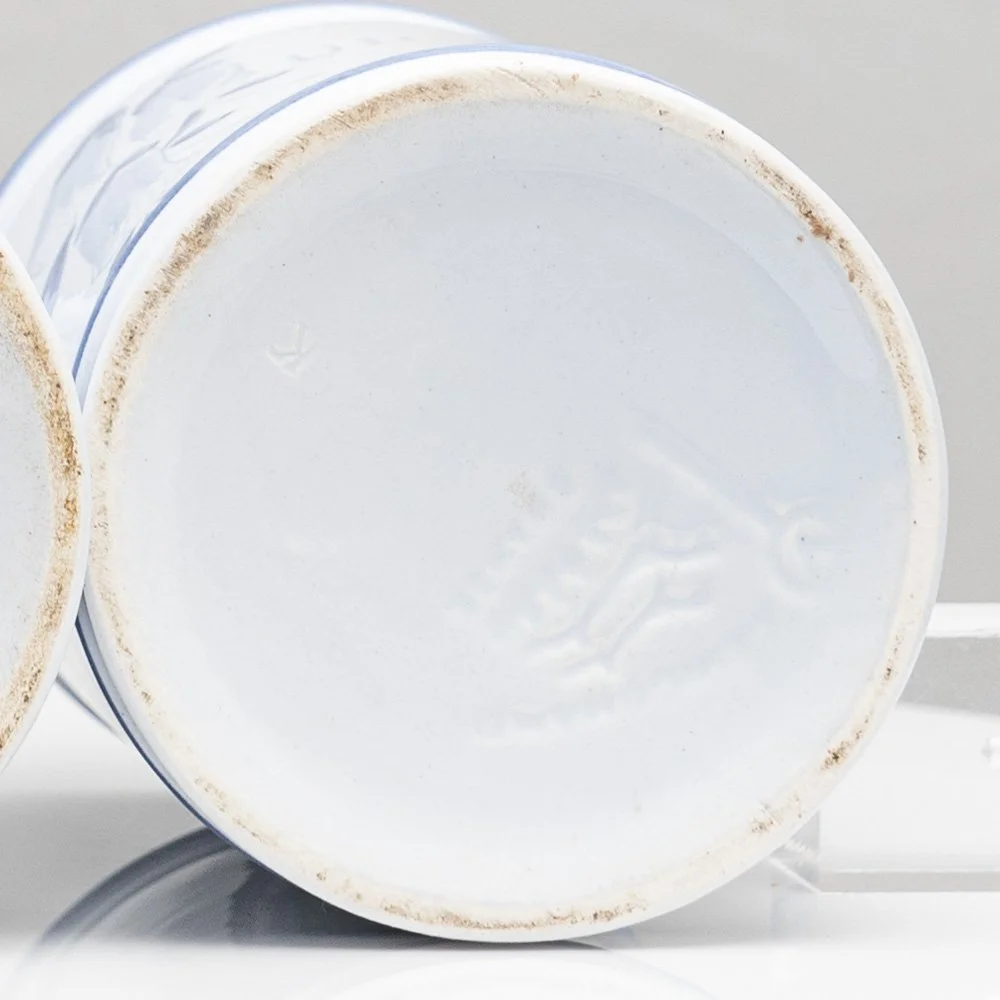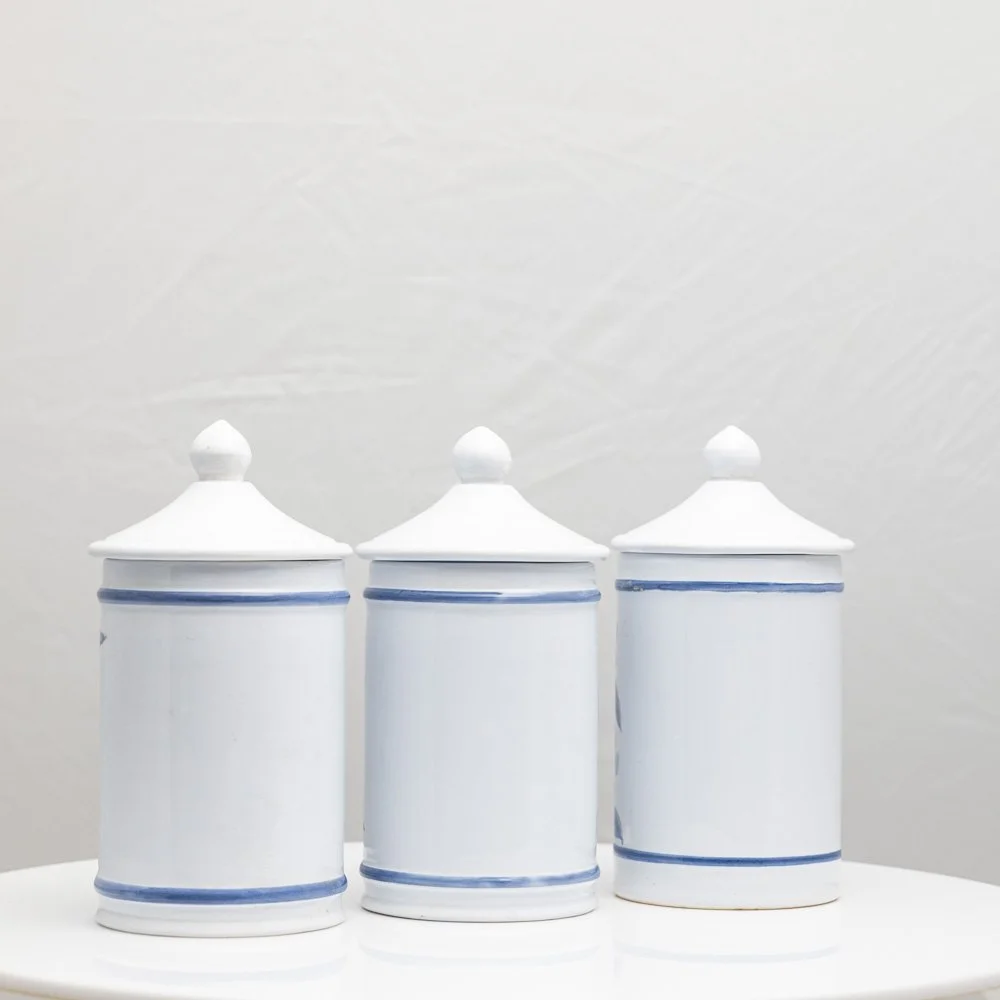1 / 11
 Image 1 of 11
Image 1 of 11

 Image 2 of 11
Image 2 of 11

 Image 3 of 11
Image 3 of 11

 Image 4 of 11
Image 4 of 11

 Image 5 of 11
Image 5 of 11

 Image 6 of 11
Image 6 of 11

 Image 7 of 11
Image 7 of 11

 Image 8 of 11
Image 8 of 11

 Image 9 of 11
Image 9 of 11

 Image 10 of 11
Image 10 of 11

 Image 11 of 11
Image 11 of 11

Vintage Longchamp porcelain Apothecary set
CA$450.00
This set of three original Longchamp vintage porcelain apothecary jars are in excellent
condition. Longchamp was established in Burgundy, France, in 1832. The jars are
hand-painted in blue on white porcelain. Not only the name of the herb or drug is
painted in capital letters across the jar, but also the medicinal parts of the
plant are illustrated.
VINCA MAJOR, the greater periwinkle, is a perennial plant with little blue
flowers that is traditionally used for its astringent and tonic properties,
especially for women’s ailments and digestive problems.
ACONITUM
NAPELLUS, monkshood or aconite, is a highly toxic flowering plant. The helmet-shaped
deep purplish-blue to violet flowers are striking. Extracts were traditionally
given to reduce fever and pain. They have also been used as arrow poisons.
DIGITALIS
(lanata), foxglove, is also a toxic plant with beautiful flowers ranging from
white to pink and violet. Foxglove is the major source of digoxin, an
ingredient of prescriptions drugs commonly used for heart failure and irregular
heartbeat.
The Longchamp hallmark is found on the bottom of
each jar. In addition, two of the jars bear the artisan’s name or establishment
to where the apothecary jar was assigned to be used: URGA and SYLVENA. Height: 7 in. Diameter: 3.5 in. Each
Add To Cart
This set of three original Longchamp vintage porcelain apothecary jars are in excellent
condition. Longchamp was established in Burgundy, France, in 1832. The jars are
hand-painted in blue on white porcelain. Not only the name of the herb or drug is
painted in capital letters across the jar, but also the medicinal parts of the
plant are illustrated.
VINCA MAJOR, the greater periwinkle, is a perennial plant with little blue
flowers that is traditionally used for its astringent and tonic properties,
especially for women’s ailments and digestive problems.
ACONITUM
NAPELLUS, monkshood or aconite, is a highly toxic flowering plant. The helmet-shaped
deep purplish-blue to violet flowers are striking. Extracts were traditionally
given to reduce fever and pain. They have also been used as arrow poisons.
DIGITALIS
(lanata), foxglove, is also a toxic plant with beautiful flowers ranging from
white to pink and violet. Foxglove is the major source of digoxin, an
ingredient of prescriptions drugs commonly used for heart failure and irregular
heartbeat.
The Longchamp hallmark is found on the bottom of
each jar. In addition, two of the jars bear the artisan’s name or establishment
to where the apothecary jar was assigned to be used: URGA and SYLVENA. Height: 7 in. Diameter: 3.5 in. Each
This set of three original Longchamp vintage porcelain apothecary jars are in excellent
condition. Longchamp was established in Burgundy, France, in 1832. The jars are
hand-painted in blue on white porcelain. Not only the name of the herb or drug is
painted in capital letters across the jar, but also the medicinal parts of the
plant are illustrated.
VINCA MAJOR, the greater periwinkle, is a perennial plant with little blue
flowers that is traditionally used for its astringent and tonic properties,
especially for women’s ailments and digestive problems.
ACONITUM
NAPELLUS, monkshood or aconite, is a highly toxic flowering plant. The helmet-shaped
deep purplish-blue to violet flowers are striking. Extracts were traditionally
given to reduce fever and pain. They have also been used as arrow poisons.
DIGITALIS
(lanata), foxglove, is also a toxic plant with beautiful flowers ranging from
white to pink and violet. Foxglove is the major source of digoxin, an
ingredient of prescriptions drugs commonly used for heart failure and irregular
heartbeat.
The Longchamp hallmark is found on the bottom of
each jar. In addition, two of the jars bear the artisan’s name or establishment
to where the apothecary jar was assigned to be used: URGA and SYLVENA. Height: 7 in. Diameter: 3.5 in. Each

